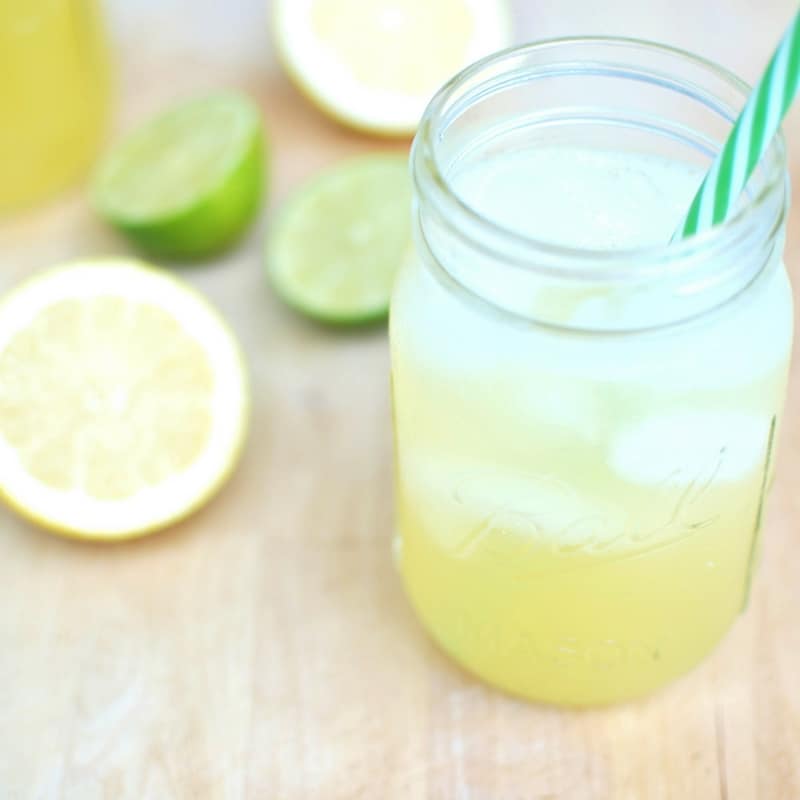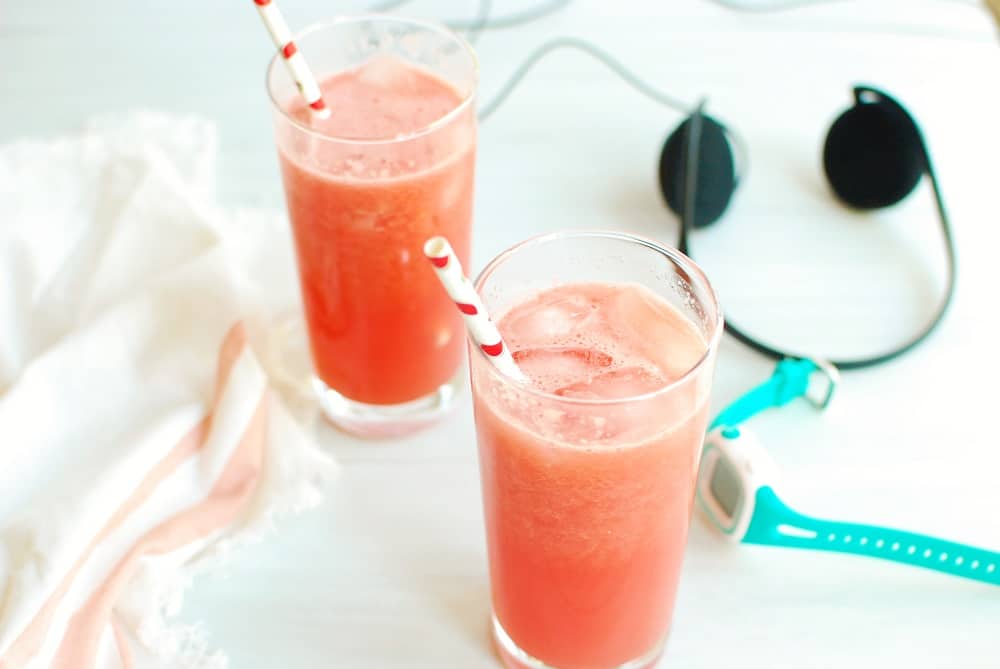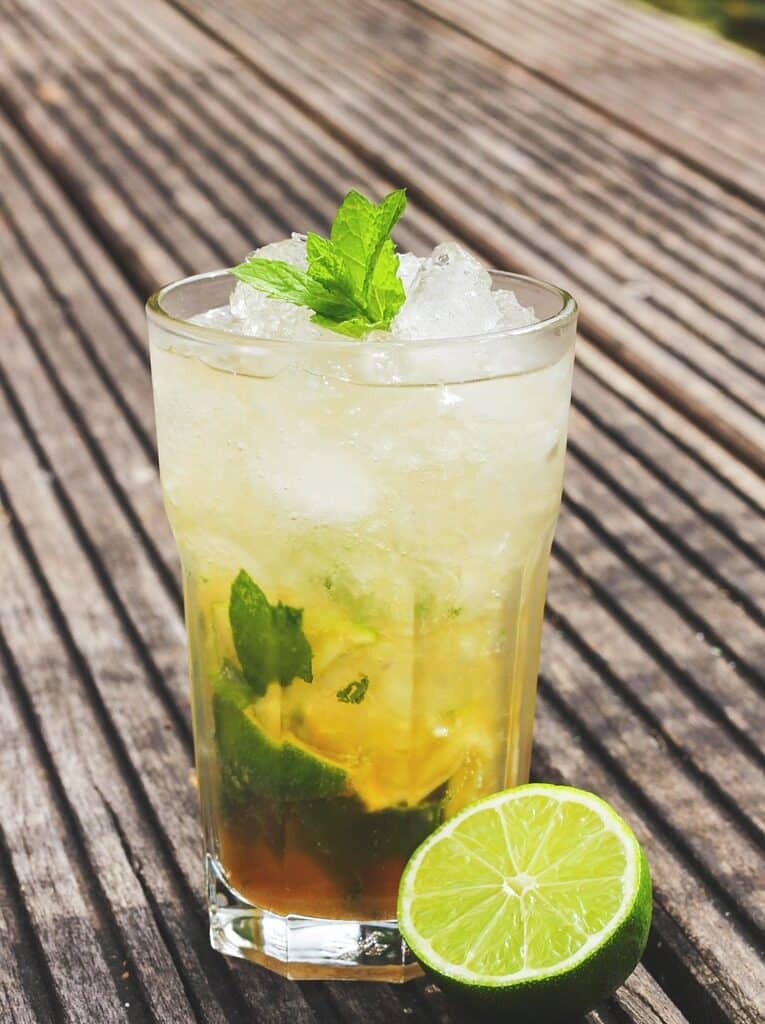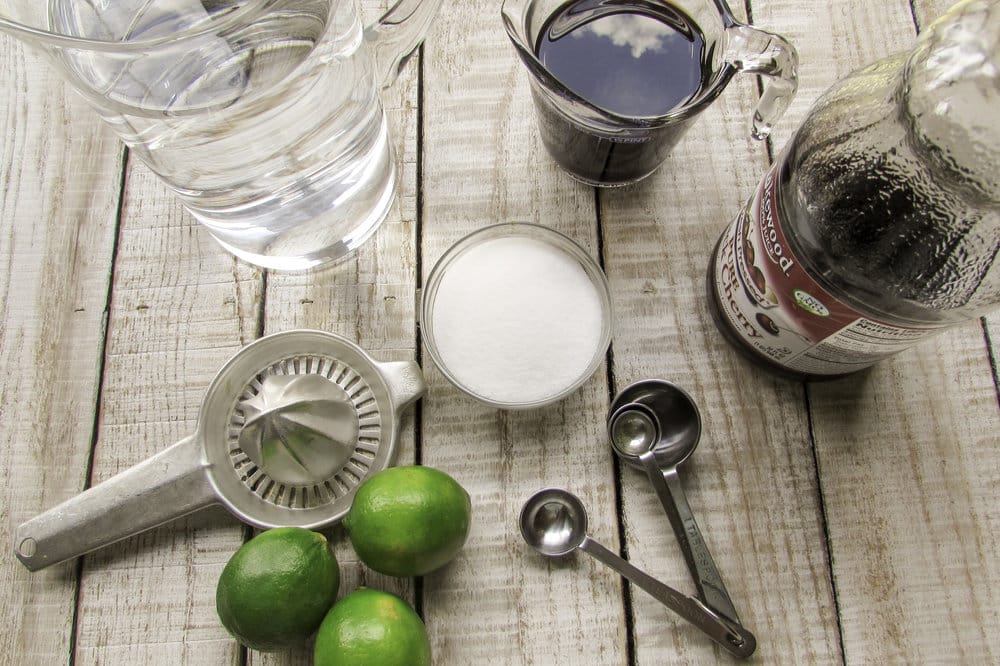Electrolyte drinks help replenish essential minerals and fluid lost through sweat, and bodily waste. Sure, there are plenty of these available on the market, such as sports drinks, pedialyte, etc. However, making a homemade electrolyte drink is simple, cost effective and totally customizable!
Why Electrolyte Drinks
Electrolytes are minerals with electric charge that play a crucial role in many physiological processes. It’s easiest to think of minerals as existing outside the body, and once they are inside, they function as electrolytes. Keep this relationship between minerals and electrolytes in mind as you continue reading. From regulating fluid balance to supporting nerve and muscle function to aiding in digestion and absorption of nutrients, electrolytes are essential for all of us, not just high level athletes.
There are two types of dietary minerals: macro and micro. The macro-minerals are generally more well-known and include: sodium, potassium, magnesium and calcium. We need these in larger amounts to support health. Micro-minerals are also important, though required in smaller amounts and less well-known. These include: iron, zinc, iodine, selenium, copper, manganese, chromium and molybdenum.
To really understand the importance of electrolytes, it’s helpful to look more closely at their function. Let’s break it down.
Fluid balance
Sodium and potassium are essential in maintaining the balance of fluids inside and outside cells. This balance is critical for proper cell function, hydration, and maintaining blood pressure. Electrolytes help regulate the movement of fluids across cell membranes, ensuring that cells receive adequate hydration and waste products are efficiently removed.
Digestion
Zinc, one of the microminerals, is required for the production of stomach acid, which is essential for good digestion. In addition, chloride, one of the macrominerals and one half of the salt (NaCl), is also necessary for stomach acid production. Thus, when electrolyte levels are low, digestive issues such as gas, bloating, food sensitivities, etc are more likely to occur.
Nerve Function
Electrolytes, especially sodium, potassium, and calcium, are essential for nerve impulse transmission. Nerves use electrical signals to communicate throughout the body, and electrolytes facilitate this process. Sodium ions play a vital role in generating action potentials, which are the electrical signals that allow nerve cells to transmit information. Potassium ions are involved in repolarizing the nerve cell membrane after an action potential, restoring it to its resting state.
Muscle Function
Electrolytes are crucial for proper muscle contraction and relaxation. Calcium ions play a vital role in initiating muscle contractions by binding to proteins within muscle cells, triggering the sliding of muscle filaments and producing the necessary force. Potassium and sodium ions help regulate the electrical signals required for muscle contraction, ensuring that muscles respond appropriately to nerve impulses. Magnesium also plays a role in muscle relaxation, as it helps counteract the effects of calcium, allowing the muscle to return to its resting state.
Kidney Function
Electrolytes play a vital role in kidney function, particularly in the regulation of fluid and electrolyte balance. The kidneys filter waste products, excess fluids, and electrolytes from the blood, maintaining the body’s internal environment. Electrolyte reabsorption and excretion in the kidneys are carefully regulated to maintain proper electrolyte balance throughout the body.
What Causes Low Electrolyte Levels
We often think of electrolyte loss in high level athletes or someone who is sick and experiencing vomiting, diarrhea, etc. However, there are a few reasons beyond excessive fluid loss that electrolyte supplementation might be beneficial.
For instance, our electrolyte needs are actually increased in certain situations, including: stress, exposure to toxins and contaminants, prescription medications, poor water and air quality. This happens because our bodies are using the electrolytes at an increased rate in order to rid the body of toxins, medications, stress hormones, etc. In addition to potential increased needs for minerals, we know that the mineral content of food is lower now due to intensive farming practices that have led to mineral-poor soil. Of course,the best place to start is fixing any of the lifestyle factors mentioned previously that might contribute to increased mineral needs. We can do this by using high quality air and water filters at home, using natural beauty and home cleaning products and addressing stress. Once we’ve done that, we can look at how best to get electrolytes into our diet. Before we look at homemade electrolyte drinks that can help with that, let’s see where we can get minerals (electrolytes) in food.
Electrolytes in Food
One easy place to start in terms of getting more minerals in the diet is to start with unrefined salt rather than refined salt that has been stripped of minerals. Fruits, leafy greens, legumes and root vegetables are great sources of minerals. Bone and vegetable broths can also be consumed daily to boost mineral consumption. If you’re looking for some mineral rich recipes to increase your electrolyte levels with foods, check out my recipes for Sweet Potato Toast and Cauliflower Rice Veggie Bowl!
Electrolytes in Water
Electrolytes occur naturally in water. However, water processing such as reverse osmosis and distillation strips minerals from water. Traditional filters, such as Brita, etc, will leave the minerals in the water while removing the toxins and chemicals that we don’t want in water. If you use reverse osmosis or distillation you can either add mineral drops to your water or use some of the homemade electrolyte drinks below to meet your electrolyte needs.
You may be thinking: “Why Homemade Electrolyte Drinks?” Why shouldn’t I buy an electrolyte drink that’s designed to replace electrolytes? Let’s take a look at the options available and why they don’t meet the mark.
Store Bought Electrolyte Drink Options
Most store bought electrolyte drinks are marketed as sports drinks. These include products like Gatorade and Powerade. However, for replenishment during and after illness, I often see Pedialyte recommended. I’ve also recently seen more natural products like LMNT marketed for athletes and so-called bio-hackers, etc.
As many of us realize, sports drinks as well as pedialyte are loaded with sugar, food dyes and other additives. Clearly, a homemade electrolyte drink can do better than that. But, what about products like LMNT, which are labeled as “no sugar, gluten free, paleo-keto friendly, etc.?” While this product is sugar free, it still contains a sweetener called stevia. It also contains citric acid, which is a preservative, and “natural flavors,” which doesn’t tell us much besides that it’s a processed food and some of its ingredients come from a lab. Importantly, LMNT also contains 1000 mg of sodium per serving, which is part of the brand’s story. However, 1000 mg of sodium is not appropriate for many individuals, including those with high blood pressure and other cardiovascular conditions. To my estimations, LMNT is not a good choice for electrolyte replacement.
Enter, homemade electrolyte drinks!
Top Picks for Homemade Electrolyte Drink Recipes
Hopefully, by this point you’re sold on making a homemade electrolyte drink! If so, you’re in luck, I’ve rounded up the best of the best options from the kitchens of dietitians! These are all easy to make and highly effective ways to increase your electrolyte intake.
Homemade Natural Electrolyte Drink

This recipe from Snacking in Sneakers combines ingredients you may already have on hand for a citrus-y, budget-friendly beverage.
DIY Watermelon Homemade Sports Drink
In this watermelon drink, Snacking in Sneakers gives training-specific tips for athletes. But, anyone can benefit from sipping on this concoction.

Citrus Electrolyte Drink
This recipe is courtesy of registered dietitian Kelli Yates and features coconut water, a popular source of minerals.

Cherry Lime and Grapefruit Electrolyte Drinks
Dietitian Laura Rutledge of The Nourishing Plate serves up 2 different homemade electrolyte drink recipes, so you can choose which is most appealing to you!

I often help clients optimize their electrolyte intake as part of their overall wellness plan. If you’d like to learn more about my approach, check out my article on the Foundations of Gut Health. If you want personalized help reaching your goals, book an intro call here.